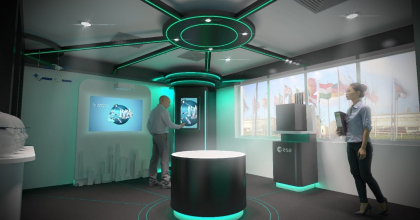To make this possible, Alphabus began a Phase B in 2002 which included the initiation of over twenty projects as a Preparatory Phase. The results have been promising with each having been designed to push the limits of technology and led by industry teams from a variety of European Member States. They are progressing well and will help secure the much-needed enabling technologies for Alphabus.
European Solutions
Though the consortium is led by an unprecedented alliance between the French companies Alcatel and Astrium, equipment providers spread around Europe and including SMEs also play an important role. Two competing projects by Jena-Optronik of Germany and Galileo Avionica of Italy are each working on an Active Pixel Sensor based Star Tracker predevelopment. This critical component will provide a cost advantage over current CCD based Star Trackers.
Similarly, the Belgian company Euro Heat Pipes with a team of 20 engineers and technicians is developing new high capacity heat pipe technology. As part of the thermal regulation system, heat pipes are key elements of any spacecraft. Satellites based on an Alphabus platform may contain several hundred metres of heat pipes.
| Added to this, a host of other preparatory projects will ensure European competitiveness in the coming decades. A new generation high power electric propulsion system is being conceived for efficient station keeping of Alphabus satellites. A new 500 N apogee boost motor (see image top-left) will not only benefit Alphabus, but will be an important asset for European space projects. A fiber optic gyro will provide a strategic non-US source for this crucial technology (see image at right).
|
|
|
Saab Ericsson Space of Sweden and EADS CASA Espacio of Spain are each involved in competing predevelopments to prepare the manufacturing technology for the central tube of the platform.
These are just a few examples of current predevelopments in the Preparatory Phase that involve companies from Belgium, Germany, France, Italy, the Netherlands, Spain, Sweden, Switzerland and the UK; striving to become part of the Alphabus consortium which will work together to benefit the European space programme and give Europe a competitive edge.
|
|
Jack Bosma, Head of The Large Platform Mission Office, wants Alphabus to be a true European endeavour. "To realise a project of this scope, it will be necessary to build up an interdependent consortium that is going to be competitive and efficient in terms of industrial return. Participation from every ESA member state is very important."
|
The future is high power
The importance of Alphabus for Europe is clear. Although well represented in the small and medium satellite markets, European satellite power ranges above this have been limited to Alcatel's Eurostar and Astrium's SpaceBus, both of which are restricted to 12kW. What this has meant is that between 1998 and 2003 the 4bn Euro global market for high power satcom has been left entirely to US manufacturers.
The Alphabus design surpasses the growth constraints of existing European platforms by providing up to 50% (to 18kW) additional payload power and increasing significantly payload mass capability and accommodation area.
|
With the expected retirement of 100 satellites between 2006 and 2011 and the trend towards increasingly greater mass and power (see chart at right) the need for Alphabus becomes apparent. Alphabus is Europe's answer to satisfying the growing demand in the commercial Large Platform Market for the coming 15 years. |
To view the Alphabus Preparatory Project Pages, just click on Projects, under Large Platform Mission on the left of this page.







